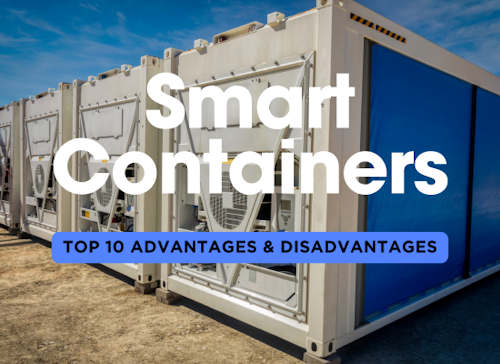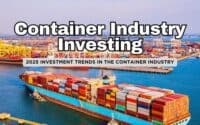Smart Containers: Top 10 Advantages and Disadvantages

Smart containers are an innovative solution in the shipping industry, equipped with advanced technology like IoT sensors, GPS, and real-time monitoring capabilities. These containers provide enhanced visibility, allowing operators to track cargo conditions and locations throughout the entire supply chain. By improving efficiency, security, and transparency, smart containers are revolutionizing the way goods are transported globally. However, while they offer significant advantages, there are also challenges to consider, such as high costs and maintenance demands, making it essential for companies to weigh the pros and cons before adoption.

Advantages
Smart containers offer a range of benefits that are transforming the shipping industry. From enhanced tracking and security to improved efficiency and cost savings, these containers bring significant advantages to modern logistics.
- Real-Time Tracking and Visibility 📍
- Advantage: Smart containers come equipped with GPS and IoT sensors, allowing real-time tracking of cargo location. This enhanced visibility helps shipping companies and customers know exactly where shipments are at all times, reducing uncertainty and improving supply chain management.
- In Depth: Fleet operators can optimize routes, avoid delays, and manage fuel consumption more efficiently. This also reduces the chance of cargo being misplaced or stolen, improving security for high-value goods.
- Improved Cargo Safety and Security 🔐
- Advantage: Smart containers monitor critical factors such as temperature, humidity, and shock. This ensures that perishable or sensitive cargo is maintained in optimal conditions, reducing spoilage and damage during transit.
- In Depth: For industries like pharmaceuticals or fresh produce, small changes in temperature can destroy products. Smart containers allow quick action when conditions change, mitigating potential losses.
- Enhanced Operational Efficiency ⚙️
- Advantage: By providing real-time data, smart containers help shipping companies streamline operations, from cargo loading to port processing. This reduces the time spent locating containers or managing misplaced goods, leading to faster loading/unloading and smoother logistics.
- In Depth: Ports equipped with IoT technology can automate much of the cargo handling process, reducing bottlenecks and human errors. This results in shorter port stays and faster vessel turnaround times, lowering operational costs.
- Cost Savings 💰
- Advantage: While the initial investment in smart containers can be high, long-term savings are significant. Reduced spoilage, fewer damaged goods, better route optimization, and lower insurance premiums all contribute to lower shipping costs.
- In Depth: Smart containers help prevent costly issues such as cargo delays, theft, and environmental damage. Data collected can be used for predictive maintenance, alerting companies to container issues before they lead to costly repairs or replacements.
- Predictive Maintenance 🔧
- Advantage: Smart containers provide real-time diagnostics, allowing shipping companies to monitor the condition of containers and predict when maintenance is needed. This prevents breakdowns and avoids costly delays.
- In Depth: Sensors can track wear and tear over time, identifying potential issues like door malfunctions or corrosion. Addressing these early reduces downtime, extends container life, and prevents costly failures.
- Better Inventory Management 📦
- Advantage: Smart containers provide real-time data on cargo status, allowing for more accurate inventory tracking and management, especially useful for large-scale operations with many containers in transit.
- In Depth: Companies can better manage inventory, reduce overstocking or stockouts, and improve supply chain efficiency. This leads to reduced storage costs and ensures goods are delivered just in time, minimizing delays.
- Improved Customer Satisfaction 😊
- Advantage: The transparency and real-time tracking provided by smart containers offer customers more visibility into their shipments, enhancing trust and satisfaction. Customers can access updates on their cargo's location and condition throughout transit.
- In Depth: For industries reliant on strict delivery timelines or sensitive cargo, this transparency allows customers to plan better and ensure their supply chains run smoothly. It also minimizes disputes about delivery times or product conditions upon arrival.
- Reduced Environmental Impact 🌱
- Advantage: Smart containers contribute to greener shipping practices by enabling more efficient route planning, reducing idle time, and optimizing fuel consumption. The data supports sustainability efforts in the shipping industry.
- In Depth: With real-time data, companies can adjust routes to reduce carbon emissions and fuel waste. Fewer damaged goods also mean fewer wasted resources, making the entire supply chain more sustainable.
- Compliance with Regulations ✅
- Advantage: Smart containers help shipping companies comply with international regulations by automatically recording data on cargo conditions, transit times, and environmental factors. This eases the process of meeting regulatory requirements.
- In Depth: In industries with stringent safety standards (e.g., medical supplies, hazardous materials), smart containers generate automated reports for compliance audits, reducing the administrative burden on shipping companies.
- Insurance Benefits 🛡️
- Advantage: Smart containers reduce the risk of cargo loss or damage, which can lead to lower insurance premiums. Insurers view real-time data as mitigating potential losses, offering lower rates to companies using smart containers.
- In Depth: Accurate, real-time data helps reduce claims for damaged or lost cargo, which can translate into significant savings on insurance premiums over time.
Disadvantages
While smart containers provide many benefits, they also come with challenges. High costs, maintenance requirements, and technological vulnerabilities are some of the drawbacks that companies must consider before adopting this technology.
- # High Initial Costs 💸
- Disadvantage: Smart containers are significantly more expensive than traditional containers due to their advanced technology, such as sensors and GPS.
- In Depth: This high upfront investment can be a barrier for smaller shipping companies or those managing large fleets, making it harder to justify the cost unless significant efficiency gains are realized.
- # Maintenance and Technology Upkeep 🛠️
- Disadvantage: The technology inside smart containers, like sensors and tracking devices, requires regular maintenance, including battery replacements and software updates.
- In Depth: These ongoing maintenance requirements increase operational costs and can be time-consuming, especially if the containers are deployed globally.
- # Cybersecurity Risks 🔒
- Disadvantage: Smart containers rely on digital systems and connectivity, making them vulnerable to cyberattacks and data breaches.
- In Depth: Hackers could potentially interfere with container data, disrupt operations, or access sensitive shipment information, adding a new layer of risk for shipping companies.
- # Dependence on Infrastructure 🏗️
- Disadvantage: Smart containers need reliable communication infrastructure (e.g., cellular or satellite networks) to transmit data effectively.
- In Depth: In regions with poor network coverage, the smart technology may not function as intended, limiting the effectiveness of real-time tracking and monitoring.
- # Complexity of Integration ⚙️
- Disadvantage: Integrating smart containers with existing logistics systems can be complex and may require investment in additional technology, training, and system upgrades.
- In Depth: This complexity can slow down the adoption of smart containers, particularly for companies that don’t have the resources to overhaul their logistics infrastructure.
- # Shorter Lifespan for Technology ⏳
- Disadvantage: The technological components in smart containers (like sensors and batteries) have a shorter lifespan compared to the container itself, necessitating frequent replacements or upgrades.
- In Depth: This can lead to higher long-term operational costs, as the technology requires more upkeep than traditional containers.
- # Data Overload 📊
- Disadvantage: Smart containers generate vast amounts of data, which can be overwhelming and difficult to manage for companies without advanced data processing tools.
- In Depth: Without proper analytics systems in place, the data can become underutilized, limiting the potential benefits of using smart containers.
- # Higher Insurance Premiums 📈
- Disadvantage: While smart containers can lower certain risks, the advanced technology may lead to higher insurance premiums due to the value of the containers themselves.
- In Depth: Insurance companies may charge more to cover the higher replacement cost of smart containers compared to traditional ones, reducing the savings on overall shipping insurance.
- Limited Availability 🚚
- Disadvantage: Smart containers are still not as widely available as traditional containers, especially in regions with less advanced logistics networks.
- In Depth: This limited availability can make it difficult for companies to fully adopt smart containers, particularly when managing international operations or working with smaller ports.
- Potential for Technological Failure ⚠️
- Disadvantage: The reliance on technology introduces the risk of system failures, such as malfunctioning sensors, connectivity issues, or software bugs.
- In Depth: If a critical system fails, it could disrupt operations and lead to significant delays or losses, making companies heavily dependent on the reliability of the technology.
ShipUniverse: Table Summary
| ShipUniverse: Top 10 Advantages of Smart Containers | |
| Advantage | Explanation |
| Real-Time Tracking and Visibility | Smart containers provide live GPS and IoT tracking, letting you know exactly where your cargo is at all times. This improves route optimization and enables faster responses to potential delays or issues. |
| Improved Cargo Safety and Security | Smart containers can monitor conditions like temperature, humidity, and shock, ensuring sensitive cargo (e.g., perishables or electronics) stays in optimal condition during transit. |
| Enhanced Operational Efficiency | By offering real-time data, smart containers streamline processes like loading, unloading, and customs clearance. This reduces manual handling and improves container management. |
| Cost Savings | Although expensive to implement, smart containers save costs through reduced cargo loss, fewer insurance claims, and improved route optimization. Reduced spoilage adds to the financial benefits. |
| Predictive Maintenance | Sensors in smart containers detect wear and tear, allowing you to schedule maintenance before breakdowns happen. This minimizes downtime and repair costs while extending the life of your containers. |
| Better Inventory Management | Real-time tracking allows for accurate inventory management, making it easier to avoid stockouts or overstocking. This leads to better supply chain control and lower storage costs. |
| Improved Customer Satisfaction | Customers gain peace of mind by being able to track their shipments in real-time. Transparent updates on cargo location and condition make for smoother supply chains and fewer disputes over delays or damages. |
| Reduced Environmental Impact | Smart containers enable efficient route planning and reduced fuel consumption, helping companies lower their carbon footprint. They also reduce waste from spoiled or damaged goods. |
| Compliance with Regulations | Automatically generated data logs from smart containers make it easier to comply with regulatory requirements, especially for sensitive goods like pharmaceuticals or hazardous materials. |
| Insurance Benefits | Since smart containers lower the risk of cargo loss or damage, insurance companies may offer reduced premiums. The added security and data tracking give insurers confidence in your risk management. |
| ShipUniverse: Top 10 Disadvantages of Smart Containers | |
| Disadvantage | Explanation |
| High Initial Costs | Smart containers are significantly more expensive due to the technology involved, such as sensors, GPS, and connectivity systems. This higher upfront cost can be prohibitive for smaller shipping companies. |
| Maintenance and Technology Upkeep | The sensors and devices inside smart containers require regular maintenance, including battery replacements and software updates. This ongoing upkeep increases operational costs. |
| Cybersecurity Risks | Smart containers rely on digital systems, making them vulnerable to cyberattacks and data breaches. Protecting sensitive information and ensuring system security adds a new layer of risk management. |
| Dependence on Infrastructure | Smart containers need reliable communication infrastructure, such as cellular or satellite networks. In regions with poor coverage, their tracking and monitoring features may not function as expected. |
| Complexity of Integration | Integrating smart containers into existing logistics systems can be complicated. It often requires investment in additional technology, training, and upgrades, making it a time-consuming process for some companies. |
| Shorter Lifespan for Technology | The technological components in smart containers (e.g., sensors, batteries) often have a shorter lifespan than the containers themselves, necessitating replacements or upgrades, which increases long-term operational costs. |
| Data Overload | Smart containers generate large amounts of data, which can be overwhelming if the company doesn’t have the right analytics systems in place. Processing and managing all this data requires additional resources and expertise. |
| Higher Insurance Premiums | Despite offering better security, smart containers themselves are valuable assets, and insurers may charge higher premiums to cover their replacement or repair costs. |
| Limited Availability | Smart containers are still not as widely available as traditional containers, particularly in less advanced or underdeveloped regions. This can hinder global adoption and limit availability for certain routes. |
| Potential for Technological Failure | As with any technology, smart containers have the risk of system failures, such as malfunctioning sensors or network issues. A technological breakdown can disrupt operations and cause delays. |

Do you have a Maritime Product or Service that may be of interest to Shipowners? Tell us about it here!
Do you have feedback or insights? Please reach out to editor @ shipuniverse.com



